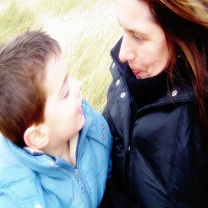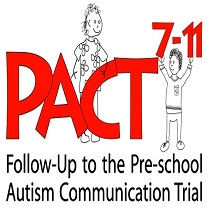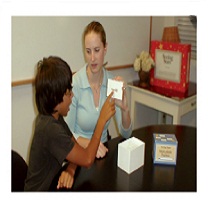Pre-school Autism Communication Trial Follow-Up at 7-11 Years (PACT 7-11)
Results announced - 26 October 2016
We are excited to announce that the results of PACT 7-11 are now available. Click here to read the press release from the Lancet and here to read the newsletter to update the families that kindly participated in the study. The full text Lancet article is here. Latest January, 2017 news here. Latest news - Professor Jonathan's Green blog here.
Introduction
The PACT 7-11 was a follow-up study to the Pre-school Autism Communication Trial. It was funded by the Medical Research Council and ran between 2013 and 2015. We saw 83% of the original PACT cohort when they were aged 7 to 11 years and carried out detailed assessments with the children and their parents. The study was an invaluable opportunity to study longitudinal development in autism and to understand more about what factors in the pre-school years affect how children develop into middle childhood. Middle childhood in autism is in itself an under-researched area, and so we are embracing the opportunity to study this well-characterised group of children and families in more detail.
Little is known about the longer term effects of early intervention for children with autism or their families. This is an opportunity to investigate longer-term effects of the PACT therapy. The PACT Trial found that the communication-based parent-mediated therapy delivered in the trial brought about positive changes in the way that parent and child communicated with each other. However these improvements did not generalise to broader measures of autism symptoms. Each family was involved in the initial PACT study for around 13 months. This was a relatively short time period and may have been too short to pick up generalisation effects that take longer to manifest. Moreover, if parents continued to implement the communication-enhanced parenting they learnt in the therapy after the trial had finished, this might bring about continued positive change.
For these reasons, we wish to follow-up the PACT children now they are aged 7 to 11 to see how they are getting on. This study will help us understand, for the first time, the impact of early intervention on later child communication, the presentation of autism, and family life, school adjustment and family need for services. The findings will potentially affect the way autism intervention is organised and methods of supporting families as their children grow older.
PACT 7-11 Research Questions
These were are main research questions:
- How are the PACT children now doing and how are they developing in areas such as: language and communication, how they get along with others, their play, behaviour and interests, and their emotional wellbeing?
- What factors in the pre-school years have affected how children are doing now?
- How is family life and how is life as a parent of a child with autism?
- What services are families accessing?
- Have the positive effects of the PACT therapy been sustained 4-6 years after the therapy ended? That is, do these parents continue to interact with their child in a way to enhance their child’s communication and do their children continue to initiate more communication?
- Do the children who were involved in the therapy show improved language skills and less severe levels of core autism symptoms (reciprocal social interaction, communication and repetitive, ritualistic and stereotyped behaviours) in the follow-up?
Are you one of our PACT families?
Thank you once again for your involvement in this phase of our project. It was wonderful to see you all again and find out how you are getting on. We appreciate your commitment to the project and the time and energy you give.
We would like to keep in touch with you and update you with our newsletters, so please do let us know if you change address. Click here for our contact details.
Findings
We have now announced our findings (26 October 2016). Please click here to read the press release and here to read the newsletter for families that kindly participated in the study.



